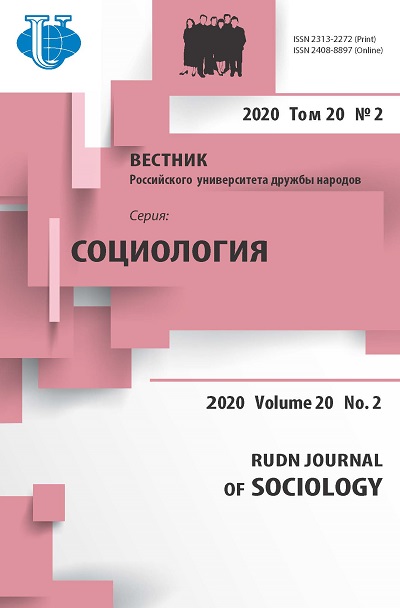Comparative analysis of the Russian and Western education and scientific-training system
- Authors: Ruban L.S.1
-
Affiliations:
- Institute of Social-Political Studies of the Federal Center of Theoretical and Applied Sociology of the Russian Academy of Sciences
- Issue: Vol 20, No 2 (2020)
- Pages: 416-429
- Section: Sociological lectures
- URL: https://journals.rudn.ru/sociology/article/view/23880
- DOI: https://doi.org/10.22363/2313-2272-2020-20-2-416-429
Cite item
Full Text
Abstract
The article compares the Russian and Western strategies of higher education and scientific training and their implementation in the state policy. The author considers the three-level structure of scientific training which includes in the West Bachelor’s, Master’s and PhD programs, while in Russia in the previous period - specialty, PhD program - to defend the thesis and get the degree of Candidate of Science - and Postdoc program - to get the degree of Doctor of Science. After Russia signed the Bologna Declaration at the Berlin Conference of ministers of education in September 2003, these differences were eliminated and already in 2010 Russia implemented all basic principles of the Bologna process by having transformed its system of education and scientific training on the basis of the British-American model. The author considers both advantages and losses of this reform. Thus, Russia introduced the same education standards with the West and accepted the single certification system (Bachelor, Master, PhD), which is certainly a positive side of the reform. On the other hand, by removing the specialty level, Russia lost the basis for mass scientific training without the Master’s level: today we have a negative situation in the system of higher education, when thousands of young people with Bachelor’s degree cannot find job or continue studying and scientific career without Master’s degree, but they do not have money to pay for Master’s program due to financial difficulties. As a result, the production and science systems do not get enough qualified specialists and young scientists for whose training the state has already spent a lot of money. The author concludes that it is necessary to use effective foreign experience but without ignoring the Russian education and science achievements and with taking into account national traditions and specifics of the national development.
Keywords
About the authors
L. S. Ruban
Institute of Social-Political Studies of the Federal Center of Theoretical and Applied Sociology of the Russian Academy of Sciences
Author for correspondence.
Email: lruban@yandex.ru
доктор социологических наук, главный научный сотрудник Отдела исследования проблем международного сотрудничества
Fotievoi St., 6-1, Moscow, 119333, RussiaReferences
- Vandam (Edrikhin) А.Е. Geopolitika i geostrategiya [Geopolitics and Geostrategy]. Мoscow; 2002 (In Russ.).
- Proskurin S.А. Geopoliticheskie factory v mirovoi politike [Geopolitical factors in the global politics]. Mezhdunarodnye otnosheniya i vneshnepoliticheskaya deyatelnost Possii. Мoscow; 2003 (In Russ.).
- Mitrokhin V.I. Metodologiya i mehanizm opredeleniya prioritetov Rossii v usliviyah globalnoi konkurentsii [Methodology and mechanism for identifying Russia’s priorities under the global competition]. Globalisatsiya: suschnost, problemy, perspektivy. Мoscow; 2003 (In Russ.).
- Ruban L.S., Кataeva Е.G., Khegai V.К. Geopoliticheskie interesy Rossiiskoi Federatsii na Dalnem Vostoke [Geopolitical interests of the Russian Federation at the Far East]. Мoscow; 2008 (In Russ.).
- Fakel, kotory nuzhno sazhech (o resultatah innovatsionnoi ploschadki) [A torch to be lit (the results of the innovative platform)]. https://www.b17.ru/article/45692 (In Russ.).
- Shraiberg Ya.L. Glavnye trendy rasvitiya mirovoi bibliotechno-informatsionnoi infrastruktury [Main Trends in the Development of the Global Library-Information Infrastructure]. Мoscow; 2019 (In Russ.).
- Makarova О.V. Magistratura I doktorantura v SShA kak osnovnye formy podgotovki nauchno-pedagogicheskih kadrov [Master’s and Postdoc programs in the USA as the main forms of training the scientific-pedagogical staff]. Izvestiya Rossiyskogo gosudarstvennogo pedagogicheskogo universiteta im. A.I. Gertsena. 2007; 17 (43–2) (In Russ.).
- Gubman B.L. Magistratura i doktorantura v stranah Zapada: vyzov obshestva, osnovannogo na znaniyah [Master’s and Postdoc programs in the West: A challenge of the knowledge society]. http://education.rekom.ru/5_2006/23.html (In Russ.).
- Federalny Zakon ot 29.12.2012 No 273-FZ (red. ot 27.12.2019) “Ob obrazovanii v Rossiiskoi Federatsii” [Federal Law No 273-FZ of 29.12.2012 (ed. on 27.12.2019) “Оn Education in the Russian Federation”]. www.consultant.ru (In Russ.).
- Chto takoe spetsialitet v VUZe i chem on otlichaetsya ot bakalavriata? [What is ‘Specialty’ at the university, and how is it different from Bachelor’s programs?]. http://www.mnogo-otvetov.ru/nauka/chto-takoe-specialitet-v-vuze-i-chem-on-otlichaetsya-ot-bakalavriata (In Russ.).
- Zaschita dissertatsii v Harvarde [Defense of the thesis at Harvard]. http://phdru.com/ abroad/harvard (In Russ.).
- Коstolomova М.V. Sistema podgotovki nauchno-pedagogicheskih kadrov v Rossii. PhD ili kandidat nauk [System of training scientific-pedagogical staff in Russia. PhD or Candidate of Science]. Nauka. Kultura. Obschestvo. 2019; 1 (In Russ.).
- Ryazantsev S.V., Ruban L.S. Krisis zapadnoi sotsiologii i novye sotsiologicheskie shkoly (Chto pokazal XIX Kongress ISA?) [The crisis of Western sociology and new sociological schools (What did the XIX Congress of the ISA show?)]. Vestnik RAN. 2019; 89 (7) (In Russ.).
- О podgotovke otchetnyh materialov ISPI RAN za 2019 god i novyh trebovaniyah k rezultativnosti NIR: Materialy zasedaniya ISPS FCTAS on January 22, 2020 [On preparation of the ISPS RAS 2019 reports and the new requirements for the research results: Materials of the ISPS FCTAS RAS meeting on January 22, 2020]. Мoscow; 2020 (In Russ.).
- UNESCO Institute of Statistics. http://www.uis.unesco.org/Science/Technology/Pages/aspx.default.














